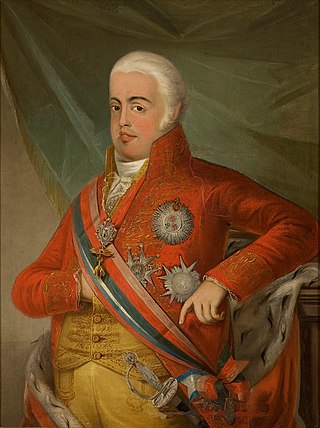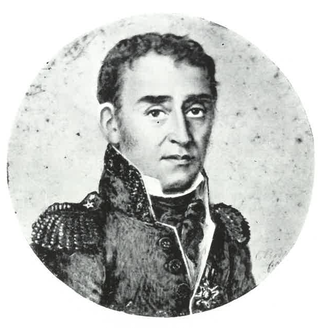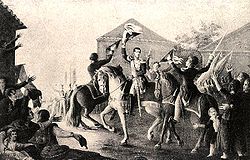
Ferdinand VII was King of Spain during the early 19th century. He reigned briefly in 1808 and then again from 1813 to his death in 1833. Before 1813 he was known as el Deseado, and after, as el ReyFelón.

Dom John VI, nicknamed "the Clement", was King of the United Kingdom of Portugal, Brazil and the Algarves from 1816 to 1825. Although the United Kingdom of Portugal ceased to exist de facto beginning in 1822, he remained its monarch de jure between 1822 and 1825. After the recognition of the independence of Brazil under the Treaty of Rio de Janeiro of 1825, he continued as King of Portugal until his death in 1826. Under the same treaty, he also became titular Emperor of Brazil for life, while his son, Emperor Pedro I, was both de facto and de jure the monarch of the newly independent country.

The Liberal Wars, also known as the War of the Two Brothers, was a war between liberal constitutionalists and conservative traditionalists in Portugal over royal succession that lasted from 1832 to 1834. Embroiled parties included the Kingdom of Portugal, Portuguese rebels, the United Kingdom, France, the Catholic Church, and Spain.

Dona Maria II "the Educator" or "the Good Mother", was Queen of Portugal from 1826 to 1828, and again from 1834 to 1853.

DomMiguel I, nicknamed "the Absolutist", "the Traditionalist" and "the Usurper", was the King of Portugal between 1828 and 1834. He was the seventh child and third son of King John VI and Queen Carlota Joaquina.

The military history of Portugal is as long as the history of the country, from before the emergence of the independent Portuguese state.

Spain in the 19th century was a country in turmoil. Occupied by Napoleon from 1808 to 1814, a massively destructive "liberation war" ensued. Following the Spanish Constitution of 1812, Spain was divided between the 1812 constitution's liberal principles and the absolutism personified by the rule of Ferdinand VII, who repealed the 1812 Constitution for the first time in 1814, only to be forced to swear over the constitution again in 1820 after a liberal pronunciamiento, giving way to the brief Trienio Liberal (1820–1823).

Vila Franca de Xira is a city and municipality in the Lisbon District in Portugal. The population in 2021 was 137,659, in an area of 318.19 km2.

José Lúcio Travassos Valdez, only Baron and first Count of Bonfim, was a Portuguese soldier and statesman.

This is a historical timeline of Portugal.

Infanta Isabel Maria of Braganza was a Portuguese infanta (princess) and fourth daughter of King John VI of Portugal and his wife Carlota Joaquina of Spain. She acted as regent for her brother Pedro IV and for her niece Maria II in 1826-1828.

The history of the kingdom of Portugal and the Algarves, from the First Treaty of San Ildefonso and the beginning of the reign of Queen Maria I in 1777, to the end of the Liberal Wars in 1834, spans a complex historical period in which several important political and military events led to the end of the absolutist regime and to the installation of a constitutional monarchy in the country.

Luís Vaz Pereira Pinto Guedes, 2nd Viscount of Montalegre, was a Portuguese soldier, who served on the absolutist side in Portugal's Liberal Wars.

Luís da Silva Mouzinho de Albuquerque was a Portuguese military officer, engineer, poet, scientist and politician, who distinguished himself during the Liberal Wars and in the conflicts that marked Portugal's history in the first half of the 19th century. He served as the Minister of the Kingdom during the liberal regency of Pedro of Braganza. This was the most prominent post inside the government at that time, which made him the Prime Minister of Portugal in all but name. He was also several times minister and deputy minister during the Constitutional Monarchical period. Among other offices, he served as Chief of the National Mint, captain-general and governor of Madeira, and inspector-general of public works. He was the grandfather of Joaquim Augusto Mouzinho de Albuquerque, a military officer and colonial administrator.
Manuel Vieira de Albuquerque Touvar was a Portuguese nobleman who served first as Captain General in the colony of Brazil, but ultimately as the 9th Captain General of the archipelago of the Azores.

Francisco de Borja Garção Stockler, 1st Baron of Vila da Praia, was a lieutenant general and the 8th Captain General of the Azores, politician, and mathematician.

The Liberal Revolution of 1820 was a Portuguese political revolution that erupted in 1820. It began with a military insurrection in the city of Porto, in northern Portugal, that quickly and peacefully spread to the rest of the country. The Revolution resulted in the return in 1821 of the Portuguese court to Portugal from Brazil, where it had fled during the Peninsular War, and initiated a constitutional period in which the 1822 Constitution was ratified and implemented. The movement's liberal ideas had an important influence on Portuguese society and political organization in the nineteenth century.

The April Revolt was an absolutist political revolt that took place in the United Kingdom of Portugal, Brazil and the Algarves on April 1824. It succeeded the 1823 Vilafrancada and foreshadowed the Liberal Wars which raged from 1828 until 1834.

The descendants of Miguel I of Portugal, of the House of Braganza, were numerous and left a lasting mark on European royalty. Miguel married Princess Adelaide of Löwenstein and the strategic marriages for all of their children into various European royalties would earn Miguel the nickname of Grandfather of Europe.
Belfastada is the name given to the military uprising against the Miguelist regime in Portugal as part of the Liberal Wars, that was triggered off in June and July 1828 in Porto, with the landing of a group of liberal exiles coming in from England aboard the Belfast ship.


















